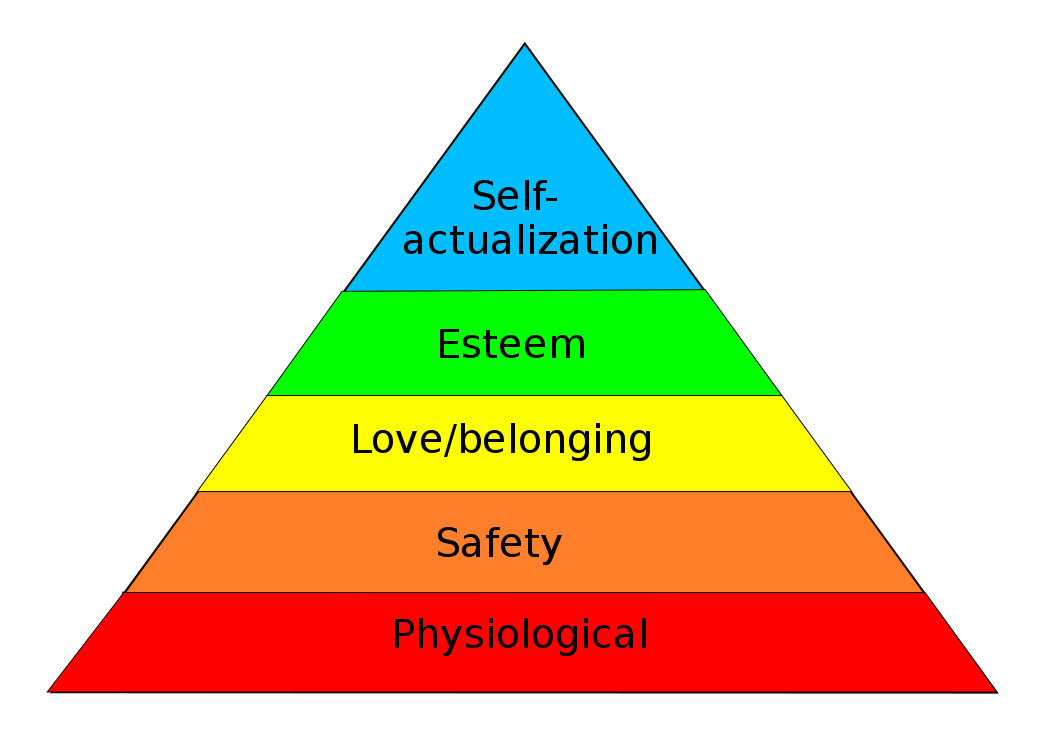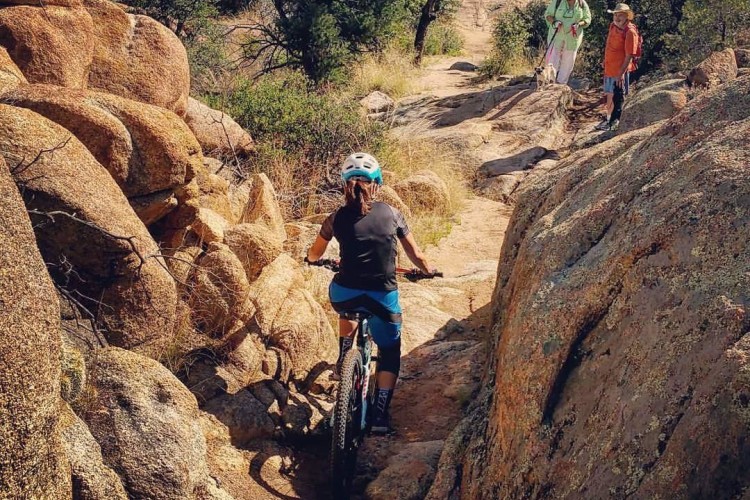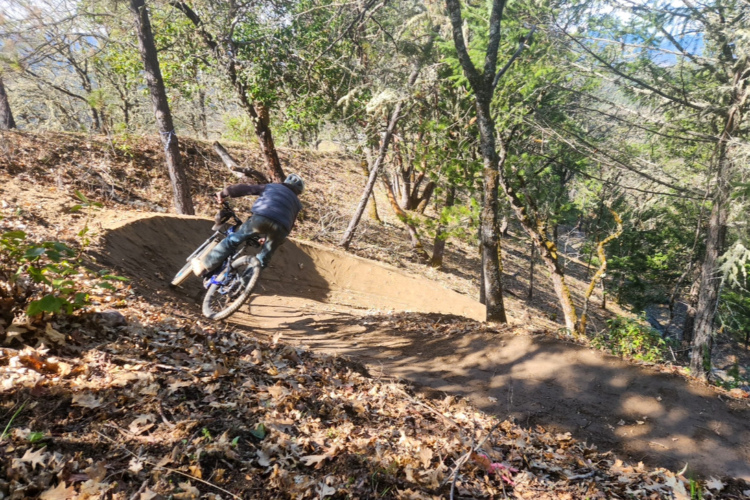Editor’s Note: “Over a Beer” is a regular column written by Greg Heil. While Greg is the Editor in Chief for Singletracks.com, any opinions expressed in this column are his alone and do not necessarily represent the opinions of Singletracks.com.
Count the number of people in your office right now. If you’re alone, consider the number of people that you rub shoulders with on a daily basis. There are as many different approaches to life as people you see—even more. Each person prioritizes different needs, desires, and goals to different extents in their lives. And yet, some needs seem to be basic to almost all human beings. One thing that varies from person to person is how they think those needs can best be fulfilled.
I’ve talked at length about mountain biking as a lifestyle, a paradigm that has the power to mold and shape–or at least have a major impact on–one’s outlook on life. Yet some people take issue with this idea.
In the comments section of a recent article that we posted to Facebook, Tomasz Kaa took this idea to task. “The amount of stupid propaganda articles I read about mountain biking being some sort of lifestyle is really astounding,” Kaa wrote. “It’s a freaking hobby, something to enjoy in your free time when not doing important things!” He then went on to construct some straw man comparisons that I don’t think anyone on the thread was actually arguing for, like: “If you had to choose between your family or your bike? This is the difference between the really important things and a hobby.”
Above and beyond the fact that this comparison is a really poor one (why not both?) and I could possibly even identify riders I know who have made many such choices in favor of the bike, I want to take some time and consider: exactly how important is mountain biking in our lives, really?
To do this, I’m going to examine Maslow’s Hierarchy of Needs. In case you’re unfamiliar, Maslow’s Hierarchy of Needs is most often represented as a pyramid-shaped structure, which you can see below. Abraham Maslow’s basic argument is that all humans have these five basic needs and that it’s difficult to achieve the upper needs without first satisfying the lower needs. However, that’s not to say that you can’t be driven by an upper-level need even if you don’t have a need lower down the pyramid fulfilled. You can be driven by multiple needs at the same time, but the pyramid structure is designed to show what’s most foundational.

In this discussion, I’m going to draw on Wikipedia’s basic description of Maslow’s Hierarchy and the five different levels it contains. All quotations are from that article unless otherwise attributed. A true psychologist would not only go into much more detail on what each of the levels means and how to define each one, but they would also argue about how accurate Maslow’s rankings are, whether or not this truly applies to all humans, etc. etc. For the purposes of this article, considering these five needs as a basic outline of what a human being requires in order to thrive should help us then examine: where does mountain biking fit into the pyramid?
Maslow’s Hierarchy of Needs
I’m going to analyze the pyramid by beginning at the top and working my way down. As Kaa’s comments illustrate, few people identify mountain biking as a basic requirement for human existence, so we’ll work from the least basic requirement to the most basic.
Self-Actualization

What does self-actualization even mean? Psychologists and philosophers engage in heated debates on this point, as the concept is quite nebulous.
For our purposes, we can define self-actualization as “the desire to accomplish everything that one can, to become the most that one can be.” This can clearly be seen in the realm of athletic competition and achievement, and we discuss this idea on Singletracks all the time. Perhaps becoming the best that you can possibly be means being the next Nino Schurter. Or maybe it means completing a 100-mile mountain bike ride, regardless of how fast you do it. Self-actualization can be defined widely depending on the person, their talents, and their ambitions. Mountain biking can easily play a major role here, fulfilling the highest level of need.
[see_also id=’196420′]
After Maslow made his case for these five needs, many psychologists have convincingly argued that there is a sixth need that ranks even higher than self-actualization: self-transcendence.
Self-Transcendence

Let’s take a second to consider self-transcendence as a sixth level, despite not being included in the classic pyramid. Self-transcendence can even be seen as the ultimate goal toward which all five of the lower needs are striving. The argument for self-transcendence says, “the self only finds its actualization in giving itself to some higher goal outside oneself, in altruism and spirituality, which is essentially the desire to reach [the] infinite.”
While some sort of spirituality and related self-sacrifice is the easiest way to conceptualize self-transcendence, there are many examples of riders using mountain biking to transcend the self. Consider longtime pros who are no longer competing in the upper echelons of the sport (self-actualization) but now have dedicated their time to a non-profit organization that strives to benefit the lives of others. Consider Hans Rey founding Wheels 4 Life, Dave Wiens serving as the Executive Director of IMBA, Rebecca Rusch raising money (and awareness) to clear unexploded ordnance in Laos, and the dozens (hundreds?) of adult racers who have made the NICA high school race league a nationwide phenomenon. The list goes on.
[see_also id=’54300′]
Esteem

“All humans have a need to feel respected; this includes the need to have self-esteem and self-respect,” says Wikipedia. “Esteem presents the typical human desire to be accepted and valued by others. People often engage in a profession or hobby [emphasis mine] to gain recognition.”
Wikipedia goes on to explain that Maslow splits esteem into higher and lower versions:
“The ‘lower’ version of esteem is the need for respect from others. This may include a need for status, recognition, fame, prestige, and attention. The ‘higher’ version manifests itself as the need for self-respect. For example, the person may have a need for strength, competence, mastery, self-confidence, independence, and freedom. This ‘higher’ version takes precedence over the ‘lower’ version because it relies on an inner competence established through experience.”
Mountain biking is one possible way to fulfill both levels of esteem. The key difference is where you derive that respect from. Do you need people to congratulate you on how skilled and how fast of a rider you are? Or are you content with seeking to master this sport on your own, achieving independence, freedom, and self-confidence through bettering yourself week after week and year after year?
[see_also id=’203862′]
Love/Belonging

While familial relationships can easily fulfill the need for love and belonging, this level of the pyramid is more accurately labeled “social belonging.” Wikipedia says, “humans need to feel a sense of belonging and acceptance among their social groups, regardless whether these groups are large or small.”
While it’s much easier—and likely much more fulfilling—to find your love and social belonging in a family setting, many mountain bikers find some level of social belonging amongst their fellow riders. This is why group rides are so common. The next time you pull up to a popular mountain bike trailhead, look around and ask yourself: how many riders do you see rolling out solo vs. in groups of two or more?
Mountain biking can easily be a solitary sport. But for many riders, mountain biking is social at its very core.
[see_also id=’6773′]
Safety

As we reach the bottom two levels of the pyramid, we’ve arrived at truly elemental needs.
Safety needs include:
- Personal security
- Financial security
- Health and well-being
- Safety needs against accidents/illness and their adverse impacts
In some sense, mountain biking can work against some of these safety needs. Mountain biking intentionally puts you in harm’s way, and will eventually cause accidents and injuries. We always gripe about how expensive the sport is, so it’s possible that mountain biking could work against your financial security.
However, “health and well-being” is also listed as a basic safety need, and the health benefits of mountain biking (both physical and emotional) are undeniable. From improving our cardiac health, to providing mental balance and wellness, curing seasonal affective disorder, and possibly being one of the best treatments for ADHD, the health benefits of mountain biking could plausibly offset the financial burden and the risk to physical safety.
[see_also id=’203940′]
Physiological

Physiological needs are the most basic of all. These include “air, water, food, sleep, clothing, shelter, [and] sexual instinct” — the basic things that you need to keep your body alive.
But how do you acquire these things? While perhaps we’d like to think that all humans are entitled to having their basic physiological needs met, food, clothing, and shelter (and sometimes water) all cost money. It’s possible that you could get these needs met without having to pay for them, but once we reach adulthood, most of us must earn money to meet our basic physiological needs.
These mountain bikers are in the minority, but a small group of riders does make their living from riding their mountain bikes. If you’re a professional racer and your income is based on pedaling a bicycle, and your participation in the sport is threatened—for example, through injury—some of your physiological needs could be threatened as well. That’s a tough reality to face.
For those living on the knife edge of the sport, success at a race could mean self-actualization—fulfilling the highest of all human needs—and failure could result in not meeting the most basic physiological needs.
Conclusion

Is mountain biking actually required to fulfill any of the levels of Maslow’s pyramid? No, of course not. As I touched on in the introduction, billions of people around the world use different methods to achieve these basic human needs, and many of them are no better or worse than any other.
The paradigm shift happens when you choose to embrace the mountain biking lifestyle. Or perhaps you fall sidelong into this life without consciously choosing to do so, until one day you wake up and realize that all you think about is bikes. Once a person has reached this point, I’ve illustrated how mountain biking can, in fact, help the rider achieve all five (or even six) levels of human need and motivation.
But is looking to mountain biking as your primary means of achieving these six needs wise, or even healthy? Is it a good idea to use mountain biking as the means to achieve these six ends? That, my friend, is a question you’ll have to answer for yourself.






















2 Comments
Jan 17, 2018
Jan 18, 2018